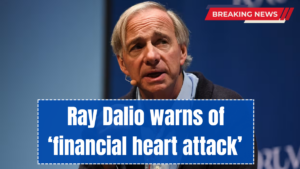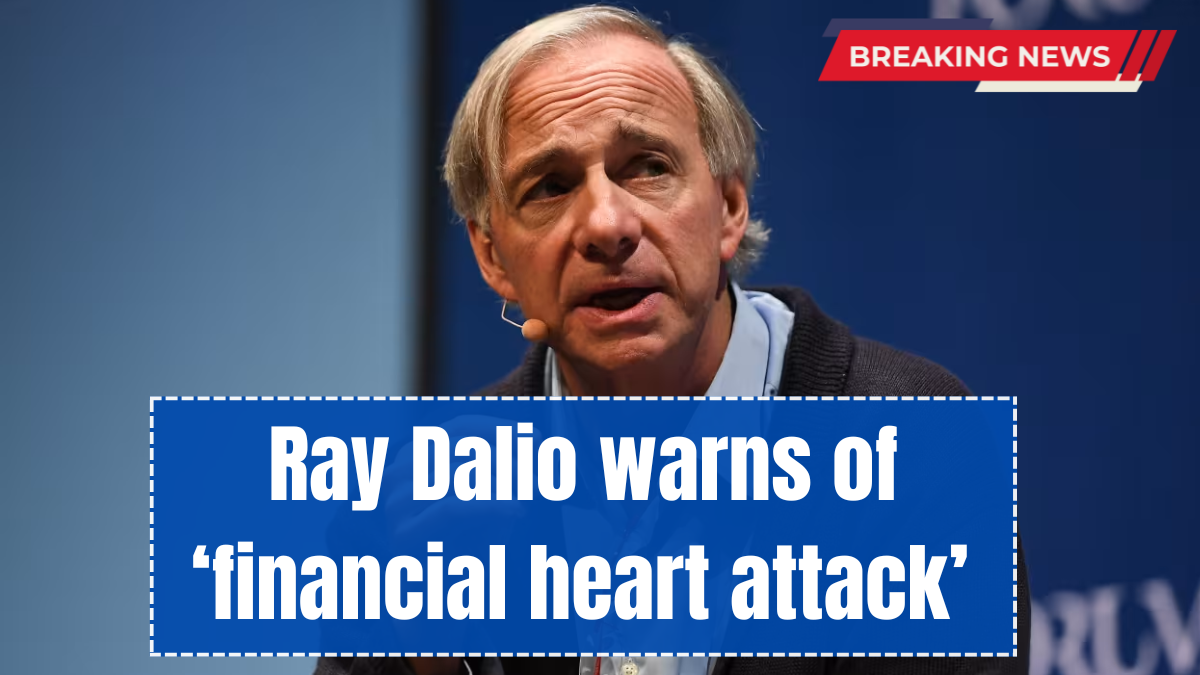As the US national debt surpasses $34 trillion, billionaire investor Ray Dalio has issued a dire warning. Speaking through a post on X (formerly Twitter), the Bridgewater Associates founder cautioned that unless immediate reforms are made, the United States could face a full-blown “financial heart attack.”
His comments come at a time of mounting economic anxiety, following President Donald Trump’s latest tariff actions that have roiled global markets. Dalio emphasized the rising cost of interest payments, now approaching $1 trillion annually, as a critical threat to America’s financial stability.

America’s Soaring Debt and Fiscal Challenges
The United States’ debt burden has been building over decades of consistent deficit spending, military outlays, tax reductions, and expanding entitlement programs. According to Dalio, the real concern lies in the interest cost — now consuming a substantial share of the federal budget.
Dalio wrote, “The level of debt our country faces is unprecedented in all of history. If we don’t effectively deal with it — and soon — our system will experience a financial heart attack.”
Adding urgency to the situation, Dalio noted that the US must refinance or repay more than $9 trillion in debt over the coming year. He warned that the “squeeze on spending simply isn’t sustainable,” highlighting that without corrective action, supply-demand mismatches could trigger widespread economic disruption.
Why the Alarm Matters
Despite the US retaining strong credit ratings and high demand for the dollar globally, the escalating debt load raises red flags among economists and policymakers. Dalio acknowledged that the issue is manageable — but only if proactive reforms are initiated now.
Without these reforms, experts fear higher borrowing costs, erosion of fiscal credibility, and a long-term weakening of America’s financial leadership. There are also concerns that essential investments in infrastructure, education, and healthcare could be severely constrained as interest payments dominate the budget.
Broader Reaction and Debate
Dalio’s message prompted swift reactions across social media, sparking debate over the root causes and potential solutions to America’s debt crisis. One commenter noted that rising defense spending and a $1.1 trillion deficit in just the first half of fiscal 2024 highlight deep structural issues.
Another added, “To create demand we borrow money. But we would have to relocate money from rich people to consumers… Loans instead of redistribution is the problem.”
Dalio also expressed rare support for Trump’s trade policies, suggesting that tariffs could serve strategic economic purposes. This stance sparked further discussion on the balance between fiscal and trade strategies as tools to reshape the American economy.
Conclusion
Ray Dalio’s stark warning on the US debt crisis paints a sobering picture of the economic path ahead. With interest payments soaring and debt refinancing looming, America faces critical choices. While the situation is not yet irreversible, inaction could trigger fiscal shocks with lasting consequences. As the debate unfolds, one thing is clear: the cost of delay is growing rapidly.
FAQs
What did Ray Dalio say about the US debt in 2025?
Ray Dalio warned that the US is facing an unprecedented debt crisis and could suffer a “financial heart attack” if urgent reforms aren’t undertaken.
How much is the US currently paying in interest on its debt?
According to Dalio, annual interest payments have reached approximately $1 trillion.
What is the total national debt of the United States in 2025?
The US national debt has surpassed $34 trillion.
Why is the debt level considered dangerous now?
Rising interest costs are taking up a large portion of the federal budget, limiting the government’s ability to invest in essential services and infrastructure.
What role do tariffs play in this economic outlook?
Dalio supports strategic use of tariffs, which he believes can reshape economic dynamics but also adds to broader fiscal uncertainty if not balanced properly.
Click here to know more.
Aanchal is a passionate writer with a keen interest in storytelling, content creation, and creative expression. She enjoys exploring diverse topics and crafting engaging narratives that captivate readers.

